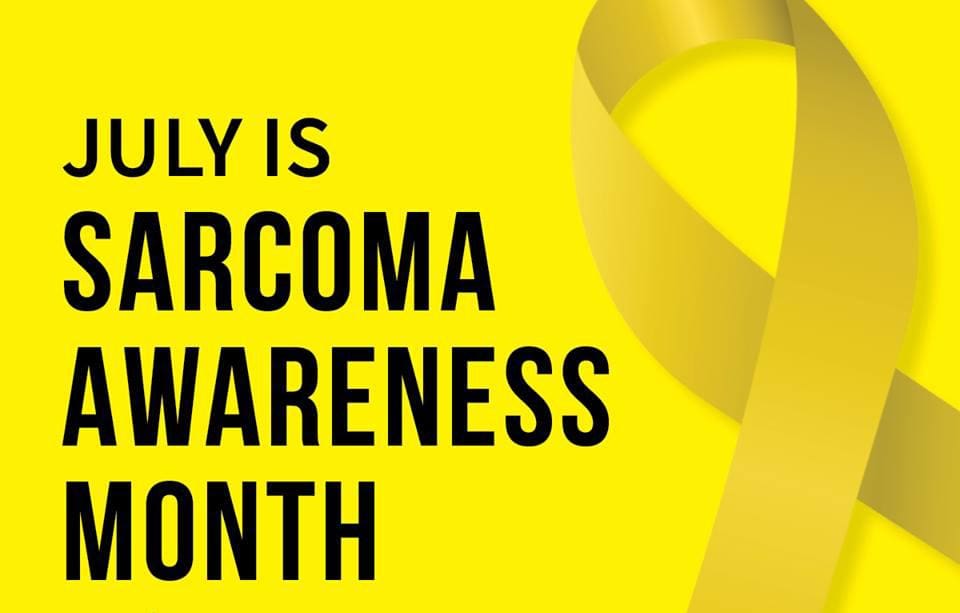Sarcoma Awareness Month runs for the whole of July.
Sarcomas are rare cancers. There are 2 main types of sarcoma:
- soft tissue sarcoma
- bone sarcoma (also called primary bone cancer).
Each year, about 4,300 people in England are diagnosed with a soft tissue sarcoma.
About 550 people are diagnosed every year with primary bone cancer in the UK.
What are the symptoms?
The most common symptom of Sarcoma is a lump that is growing or changing.
Other symptoms can include:
- Swelling, tenderness or pain in the bone that can be worse at night
- Stomach pain
- Feeling sick
- Loss of appetite or feeling full after a small amount of food
- Blood in your poo or vomit.
What causes Sarcoma?
Sarcomas are not fully understood. To fully understand sarcoma development, more research is needed.
There are a few things that can increase the risk of sarcoma:
- Age – although people can get sarcoma at any age, like other cancers, the risk increases as we get older.
- Genetic conditions – some rare genetic conditions can increase your risk of getting sarcoma. Neurofibromatosis and Li-Fraumeni syndrome are some examples.
- Previous radiotherapy – very rarely, some people who had radiotherapy for another type of cancer may develop soft tissue sarcoma years later.
- Exposure to chemicals – certain chemicals including vinyl chloride, dioxins and phenoxyacetic herbicides have been associated with increased rates of soft tissue sarcoma.
- Bone conditions – some bone conditions such as Paget’s disease can increase the risk of developing bone sarcoma.
Some people think that injuries can cause sarcoma. Currently, there is no evidence to support this claim. The condition can, however, highlight an existing sarcoma, which can be found through x-rays and scans.
Who does Sarcoma effect?
Sarcoma can affect anyone of any age. It’s the third most common cancer in children, but it’s more common in middle-aged or elderly people.
What are the treatment options?
Depending on the individual’s circumstances, Sarcoma patients might also receive chemotherapy or radiotherapy.
Living with and beyond Sarcoma?
You will need to attend regular follow-up appointments for several years after sarcoma treatment.
The usual practice will include:
- a chance to discuss symptoms
- an examination to look for any signs of the sarcoma returning
- a chest x-ray to rule out any secondary cancers occurring in the lungs
It is a good idea to check for recurrences yourself through self-examination. Your doctor or sarcoma clinical nurse specialist can tell you what to look for.
This can be a frightening and stressful time. It’s important to seek out support.
Support
Just remember that you are not alone.
Sarcoma Support Line
You can email them at supportline@sarcoma.org.uk.
Or you can free phone 0808 801 0401. They are open Monday – Friday 10 – 3 (except bank holidays).
You can also text 07860 058830 for those times you don’t feel like talking.
Extra Support
Along with the assistance you receive from your doctor and the expert sarcoma team, you may need additional help.
They are available to speak to Monday to Friday, 10 am to 3 pm.
They can also put you in touch with sarcoma support groups, which provide you the chance to interact with others going through a similar experience.
There is no right or wrong way to feel or react to diagnosis.
You could be upset, unhappy, or worried about the future. You could be worried about how the news will affect your loved ones as well. Discussing your worries with family or friends may make you feel better.
You might find it beneficial to discuss your diagnosis with your doctor or clinical nurse specialist for sarcoma. They’ll be able to reply to any questions you might have.
They could also be able to arrange for you to see a counsellor for additional help, giving you a private and secure setting to voice your worries. Your GP will have access to neighbourhood counselling programmes that can support cancer patients.
You may also find this list of the support and services offered by other organisations helpful which can be found on the Sarcoma website https://sarcoma.org.uk/.
We hope this information has been helpful.
If you would like to book onto one of our First Aid or Mental Health First Aid Courses so you can learn life-saving skills, please call us on 01276 586943 or email us at admin@crosscountiestraining.co.uk for hassle-free bookings.
